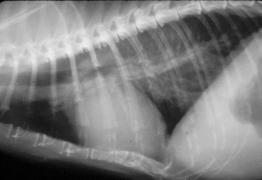Heart Healthy Tests for Pets

Heart Healthy Tests for Pets
In addition to being National Pet Dental Health Month, February is American Heart Month. Veterinary patients suffer from heart disease, although coronary artery disease, which is common in people, doesn’t occur in dogs and cats. Even so, cardiologists at The Animal Medical Center use a variety of diagnostic tests to determine if their patients have heart problems requiring treatment.
Auscultation
The stethoscope has been around since the early 1800s when it was invented by French physician René Laennec. Every veterinarian has a stethoscope and they use their stethoscopes to determine the heart rate, heart rhythm and heart sounds. Abnormal heart sounds, also known as murmurs, may be “innocent” or of no concern. Innocent murmurs are most commonly heard in pediatric patients. In adult dogs and cats, the development of a heart murmur typically indicates leaky heart valves. If your veterinarian hears a heart murmur, consultation with a board certified veterinary cardiologist for additional testing may be recommended by your primary care veterinarian.
Electrocardiogram
An electrocardiogram measures the electrical impulses produced by the heart. The recording is a graphic representation of the heart’s rate and rhythm. The normal heart rate varies depending on whether your pet is a dog or cat. Cats have a higher heart rate than dogs, and small dogs tend to have a higher heart rate than large dogs. A normal heart beats regularly. Heartbeats that occur at irregular intervals, called an arrhythmia, indicate heart disease and often land a pet in the animal ICU for emergency treatment by a veterinary cardiologist to correct the abnormal rhythm. Pets with serious abnormal rhythms may be very weak, faint and in rare cases, die suddenly.
Chest X-rays
Radiographs or x-rays show the size of your pet’s heart and the surrounding lungs. Enlarged hearts can occur with diseases of the heart muscle or as a result of leaky heart valves. When the valves are extremely leaky or the heart muscle becomes very weak, heart failure occurs. Heart failure allows fluid to build up in the lungs. This buildup of fluid, called pulmonary edema, can be seen on an x-ray as fluffy white patches in the normally black lungs.
Echocardiogram
Echocardiograms are ultrasounds of the heart. They use sound waves to create a real-time moving image of the heart as it beats inside the chest. The sound waves are created and recorded via a probe placed on the chest over the heart. As the probe is moved, different parts of the heart come into view. The computer inside the echocardiography machine is able to precisely measure the thickness of the heart walls, the valves and measure the rate of blood flow throughout the heart given your pet’s cardiologist an exact measure of how well all components of the heart are functioning. An echocardiogram is used to diagnose nearly all forms of dog and cat heart disease, including the most common form of heart disease in dogs, leaky valves, and in cats, heart muscle disorders.
Brain Natiuretic Peptide (BNP)
If your veterinarian recommends a BNP test as part of a cardiac evaluation, she has not lost her mind. Although the name seems just plain wrong for a heart test, BNP is actually a small hormone produced by the heart. Production increases when the heart muscle is excessively stretched, as in cases of heart failure. Sometimes the clinical signs of heart failure overlap with the signs other diseases causing breathing difficulties, including heart failure and pneumonia. This blood test provides a non-invasive method to help differentiate between cardiac and non-cardiac causes of respiratory problems. This test is most useful when combined with the other tests mentioned previously.
What can you do to have a heart healthy pet?
- Keep in mind no test is perfect. It may take a battery of tests to determine your pet’s cardiac condition.
- Excessive coughing or breathing difficulty in your pet should be evaluated immediately by a veterinarian.
- Packing on the pounds puts extra stress on the heart. Keep your pet in ideal condition.

































